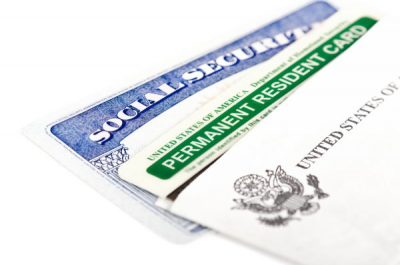USA permanent residency, or Green Card, is an immigration status that allows foreign migrants to permanently live and work in the United States. Those who obtain lawful permanent residency are issued a Green Card, commonly known as a Permanent Resident Card.
Through the EB-5 program, applicants can obtain Permanent Resident status and acquire a Green Card in the United States once USCIS has approved their I-526 application. In the interim, they can utilize a travel visa to visit the United States.

Non-Marginal Enterprises refer to businesses that have the potential to create or preserve a certain number of jobs for qualified U.S. workers. In the context of the EB-5 visa program, investing in a non-marginal enterprise is one of the requirements for obtaining a Green Card.
If the immigrant investor is already in the United States, they can apply for “Adjustment of Status” by submitting Form I-485. This application is aimed at becoming a U.S. Conditional Permanent Resident. However, visa applicants who are not present in the United States at the time of their I-526 form approval must file the DS-260 application during the visa process to obtain conditional permanent residency. This application can be filed by EB-5 applicants or by an immigration attorney at a U.S. consulate or embassy abroad. It also entails an interview at the U.S. consulate or embassy.
It’s important to note that during the EB-5 visa process, investors initially become conditional two-year permanent residents rather than full permanent residents. This conditionality allows the U.S. government to oversee the investor’s EB-5 investment for two years. However, the investor can apply for full permanent residency or a full EB-5 Green Card by filing the I-829 application at the end of this period. Upon acceptance of this application, the investor, their spouse, and their unmarried children under 21 can permanently live and work in the United States for the rest of their lives. Furthermore, if the investor holds the Green Card for at least five years and meets specific requirements—such as
They may also apply for naturalization as per the United States nationality law.
Responsibilities of Permanent Residents:
U.S. citizenship and permanent residency are different and should not be confused. Permanent residents are not allowed to hold U.S. passports; they remain citizens of their home country. Additionally, permanent residents are not allowed to vote or run for office in U.S. elections. However, citizens have certain advantages, such as easier family immigration processes, access to federal jobs, and eligibility for various assistance programs, including medical care and Social Security. Permanent residents have physical residence requirements to fulfill, unlike citizens. If permanent residents remain outside the United States for over a year without obtaining a proper re-entry permit, they may risk losing their residency status. To enjoy the rights of Americans, permanent residents must file for citizenship through USCIS. Typically, permanent residents can apply for full citizenship after residing in the United States for five years.
EB5 States is here to assist you in your journey toward U.S. citizenship through investment. We have successfully guided numerous families through the EB-5 immigration process. Our experts can answer your questions regarding EB-5 visa cost, direct investment options, EB-5 visa waiting time, the concept of EB-5 regional centers, and more. We can also guide you step by step through the EB-5 process.
Please contact us for further information to schedule a one-on-one meeting with Vivek Tandon, Esq., a U.S. lawyer and investment banker.
US Programs
European programs
Email : info@EB5States.com
Copyright © 2022 EB5 States | All Rights Reserved